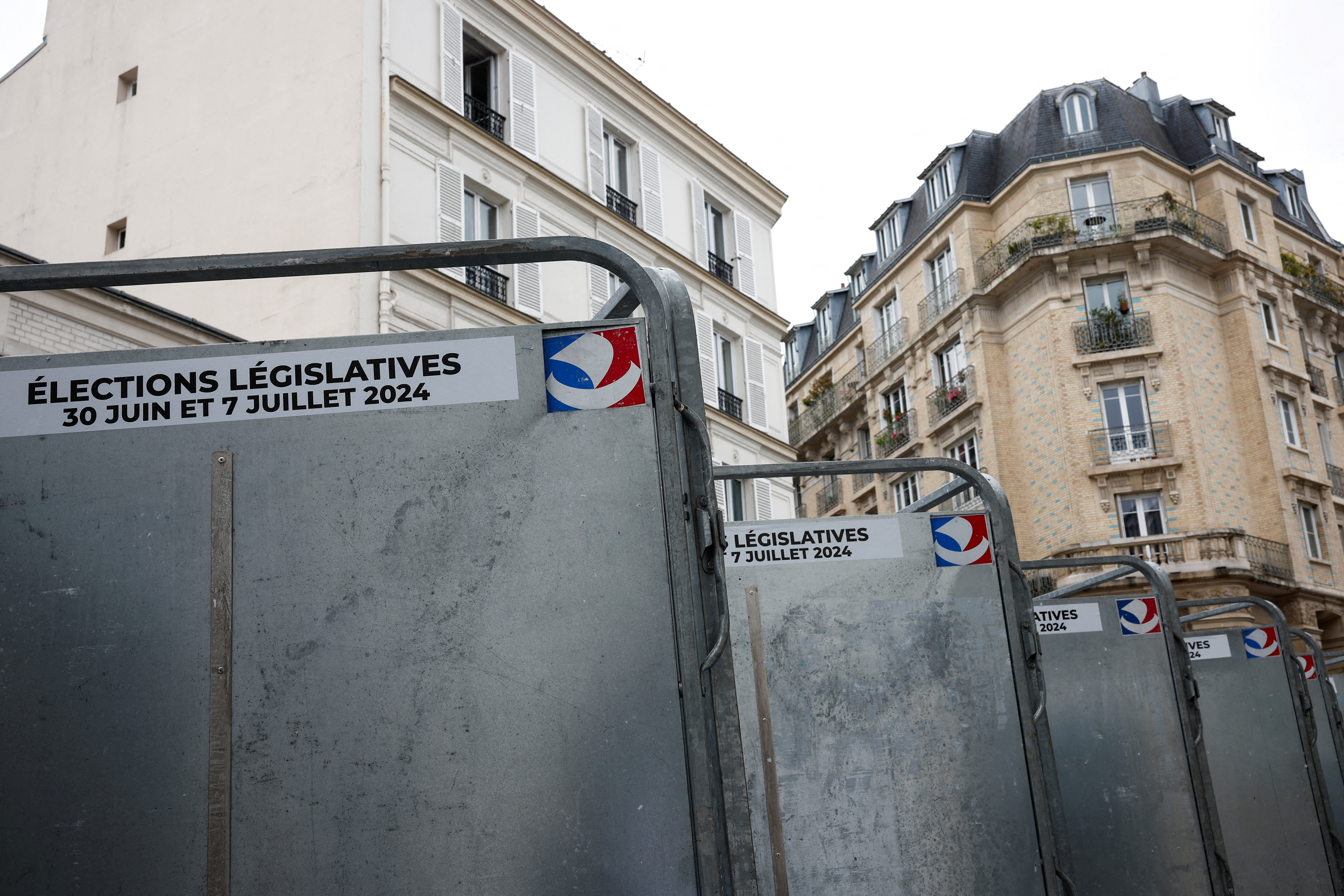France’s election stokes far-right linked violence

By Juliette Jabkhiro and Layli Foroudi
PARIS (Reuters) – When a Green party activist was headbutted in the street, his attackers told him there was more to come when the far right’s Jordan Bardella wins France’s parliamentary election. A Muslim family received a note with similar threats.
Hours after Bardella’s National Rally (RN) party scored big in the European election this month, four men in Paris assaulted a teenager at whom they hurled homophobic and transphobic slurs.
The four, who were found guilty and sentenced after the attack, told police they were RN party members and members of the violent far-right GUD group, the Paris prosecutor’s office said.
While the interior ministry says it does not have consolidated numbers on such incidents, they offer a snapshot of what rights groups say are a rising number of assaults motivated by race, religion, homophobia, transphobia and political allegiance during campaigning for France’s snap election.
The RN says it has no links to violent far-right and neo-Nazi groups. It did not reply to a request for comment about the spate of incidents since the European election.
Opinion polls project the RN will emerge as the dominant political power after the two rounds on Sunday and July 7, winning support from French people who say President Emmanuel Macron’s centre-right party has ignored their concerns about the rising cost of living and weaker public services.
“We’ll smash you, Bardella will win, and it starts now,” Green party activist Olivier Richard recounted the two young attackers as saying. They headbutted him in the face in Bordeaux as he carried pamphlets for the left-wing New Popular Front, which is expected to come second in the vote.
“They were sure they were going to win and could do what they wanted. This situation is terrifying,” Richard said.
‘RED LINE’
Political tensions have long intensified ahead of votes in France. But rights groups and activists say something has shifted this time, with violent individuals holding far-right sympathies seemingly feeling emboldened to physically and verbally assault others.
Michael Colborne, researcher for Bellingcat on transnational far-right networks, said that if the RN was to take power, young men could feel empowered to ‘take matters into their own hands’.”
“These violent far-right extremist groups are slowly growing, consolidating, and preparing to use violence,” he said.
Interior Minister Gerald Darmanin has warned of the potential for “extremely strong tensions”. He announced this week he had shut a number of far-right groups, including the GUD.
Before Darmanin took action against the GUD, Bardella, who would most likely become prime minister if the RN wins a majority, said he would close down violent groups from the ultra right and ultra left.
“I would protect individual freedoms, the freedom to protest … My red line is violence,” he said.
Rights groups report a rise in racist, homophobic and transphobic attacks since the June 9 European election, which saw Marine Le Pen’s RN trounce Macron’s ruling party, prompting Macron to call the shock election.
Anti-racism campaigner Saphia Ait Ouarabi said she had in the past weeks been on the receiving end of racial abuse online.
“Far-right ideas radicalise people on the ground and it spurs them to commit violent acts,” she said.
HATE SPEECH
The Collective Against Islamophobia in Europe (CCIE) said it received a record number of reports of Islamophobic acts during June 2024 – 145 to June 25, up from a monthly average of 85 – with a sharp rise of verbal aggressions targeting veiled women on the street.
A Muslim man in the region of Haute-Savoie contacted the CCIE and filed a complaint to the police after he received a note about his family, seen by Reuters, saying: “You are going to get fucked by Bardella soon! Get out of this residence before we make you get out!”
The rights group Inter-LGBT also said it had observed a spike in reports of hate speech and violence.
France’s human rights commission, the CNCDH, in an annual report published on Thursday, said that 2023 saw a rise in racism and xenophobia, amplified by the war in Gaza and by debates echoing the RN’s idea of “preference” for French nationals.
It said that last year reports of antisemitic and anti-Muslim acts increased by 284% and 29% respectively, while other types of racist acts increased by 21%.
Reuters spoke with four activists and politicians with the NFP left-wing alliance who have been physically or verbally assaulted by RN supporters while campaigning ahead of the vote on Sunday.
Attacks on politicians in France had already been rising in recent years, as in some other countries including Germany.
There were 2,387 incidents in the first three quarters of 2023, compared with 2,265 for 2022, when incidents rose by 32% compared with 2021, according to the French Interior Ministry. The majority of victims are local politicians.
“We’ve been in a very tense situation since the dissolution of parliament,” said Murielle Fabre, president of the Mayors of France association, however she added that she did not have enough evidence to suggest political motivations.
Anne Bachman, a municipal councillor with the Communist Party in Fos-sur-Mer, said she had filed a complaint to the police after she was threatened by a woman who had previously told her she was a far-right voter.
“The climate has changed, people are out in the open, they don’t hide that they are far right, they feel strong,” she said.









